TEXTILE MACHINE MAKERS
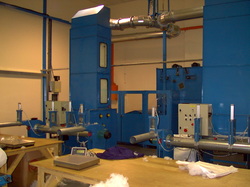
TEXTRONIX have been manufacturing textile machines in our own UK factory for 25 years. We trade under the names of Hearl Heaton & Sons Limited and TEXTRONIX LIMITED. Our production program includes those of North West Engineering Ltd who we acquired in 1998, originally this was the Redshaw Lister Company a manufacturer of carding and rag grinding equipment. We now include the production facilities of Arthur Heaton & Company we now produce their range of textile accessories including card and hopper combs, fettling plates, and woollen condensor bobbins, both of these companies were based in Heckmondwike in the West Riding of Yorkshire.
Our main expertise is fibre processing machinery, which we manufacture in our own engineering works in Dewsbury, West Yorkshire. This manufacturing program includes turning, milling, punching, grinding pressing tool making, sheet work, cutting and folding, plasma cutting, cast iron, steel & stainless steel welding.
We also provide after sales service spares and repairs to keep your processing machinery in peak condition. Our aim is to produce innovative machines to high levels of production efficiency reliability and safety.
The main sectors of the textile industry we service are fibre filled cushions for sofas, both Rolled Batt and Blown, Scatter Cushions, Feather filled Cushions, Pillow manufacture, Polystyrene Bean Bag Plants, and ancillary machinery . If you require bespoke machinery to fill a gap in your production line we would be pleased to consider designing and building it for you.
Our main expertise is fibre processing machinery, which we manufacture in our own engineering works in Dewsbury, West Yorkshire. This manufacturing program includes turning, milling, punching, grinding pressing tool making, sheet work, cutting and folding, plasma cutting, cast iron, steel & stainless steel welding.
We also provide after sales service spares and repairs to keep your processing machinery in peak condition. Our aim is to produce innovative machines to high levels of production efficiency reliability and safety.
The main sectors of the textile industry we service are fibre filled cushions for sofas, both Rolled Batt and Blown, Scatter Cushions, Feather filled Cushions, Pillow manufacture, Polystyrene Bean Bag Plants, and ancillary machinery . If you require bespoke machinery to fill a gap in your production line we would be pleased to consider designing and building it for you.
Cushion Blowing Machinery & Systems
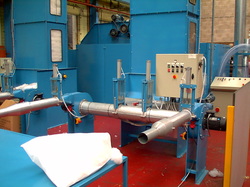
TEXTROFIL Tower cushion filling system
Our Production system is manufacture to process grade A polyester fibre from 6 to 15 denier 51 -75mm long at production levels over 400 kg per hour. Our first plant of the design shown to the left on its first day of production in 2001 produced 4000 200 gram fill scatter cushions in a one hour test run. This level of production goes past normal levels that can be sustained by both man and machine on a regular basis. We normally guarantee the high speed carding machine will produce a minimum of 400 kg per hour of grade A polyester for the filling operators to blow into the cushion cases.
Each Tower has two filling fans which can be controlled in two ways:
1. Fibre delivery speed from the vertical silo (Production)
2. Fan speed (Cushion Density)
The combination of the two along with filling techniques used by the operative will achieve a high quality blown cushion.
We normally recommend 4 fans to one card for scatter cushions up to 350 grams, larger scatter cushions and sofa seats and backs will require one Tower with two fans, to match the production to the high speed carding machine.
Our Production system is manufacture to process grade A polyester fibre from 6 to 15 denier 51 -75mm long at production levels over 400 kg per hour. Our first plant of the design shown to the left on its first day of production in 2001 produced 4000 200 gram fill scatter cushions in a one hour test run. This level of production goes past normal levels that can be sustained by both man and machine on a regular basis. We normally guarantee the high speed carding machine will produce a minimum of 400 kg per hour of grade A polyester for the filling operators to blow into the cushion cases.
Each Tower has two filling fans which can be controlled in two ways:
1. Fibre delivery speed from the vertical silo (Production)
2. Fan speed (Cushion Density)
The combination of the two along with filling techniques used by the operative will achieve a high quality blown cushion.
We normally recommend 4 fans to one card for scatter cushions up to 350 grams, larger scatter cushions and sofa seats and backs will require one Tower with two fans, to match the production to the high speed carding machine.
Combined Mini Card & Blowing
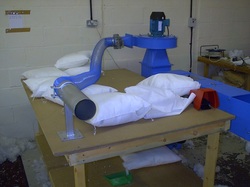
NWE Mini Blower
We offer this UK manufactured fibre filling machine for smaller operations. Generally production levels are between 50 - 80 kilos per hour. Higher production levels of up to 150 kilos per hour have been recorded but this is with highly skilled operatives. We offer clients two systems:
1. Manual feed:- This system has a manual hopper to provide fibre to hand for the operator to scatter on the Mini Blower feed sheet. The operator presses a foot peddle to start the operation of filling the cushion. This automatically starts the variable speed feed rollers and opens the blastegate filling the cushion. When the operative feels the cushion has achieved the correct weight lifting their foot off the peddle stops the feed and then the closes the blastegate. The filling table combines a weighing scale for immediate check weighing of the cushion. We offer this CE marked safety compliant machine at a cost £9,000
2. Automatic feed:- This system has an automatic hopper feed which presents the fibre in a constant manor to the Mini Blower feed sheet reducing operator error and machine blockages maintaining higher production. The feed operation and filling of cushions is the same as for the manual feed system Our cost for an automatic hopper feed and mini Blower is a competitive £18,000.
We offer this UK manufactured fibre filling machine for smaller operations. Generally production levels are between 50 - 80 kilos per hour. Higher production levels of up to 150 kilos per hour have been recorded but this is with highly skilled operatives. We offer clients two systems:
1. Manual feed:- This system has a manual hopper to provide fibre to hand for the operator to scatter on the Mini Blower feed sheet. The operator presses a foot peddle to start the operation of filling the cushion. This automatically starts the variable speed feed rollers and opens the blastegate filling the cushion. When the operative feels the cushion has achieved the correct weight lifting their foot off the peddle stops the feed and then the closes the blastegate. The filling table combines a weighing scale for immediate check weighing of the cushion. We offer this CE marked safety compliant machine at a cost £9,000
2. Automatic feed:- This system has an automatic hopper feed which presents the fibre in a constant manor to the Mini Blower feed sheet reducing operator error and machine blockages maintaining higher production. The feed operation and filling of cushions is the same as for the manual feed system Our cost for an automatic hopper feed and mini Blower is a competitive £18,000.
Hearl Heaton & Sons Limited / Arthur Heaton & Company carding Comb blade makers
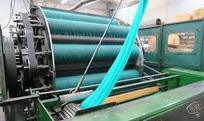
We have purchased the textile ancilary production machinery for comb blades and condenser bobbins from Arthur Heaton & Company and own the trading name Hearl Heaton &Sons Limited. We now produce Condenser bobbins for woollen carding, card doffing comb blades, and comb stocks, hopper comb blades with or without wood mounts, and card clothing fettling plates at our production facility at Scout Hill Mills, Dewsbury. We have small stock levels currently and we are making to order. If you buy regular products we are willing to hold stock please email arthurheaton@textronix.net with your requirements. We currently hold stock of 70 different comb and fettling plate products and £20,000 of stock. Since purchasing Arthur Heaton & Company we have upgraded the machinery with CNC control and automation of the processes first developed in 1809 by Samuel Standring.
Rolled Batt Cushions For Sofa Seats
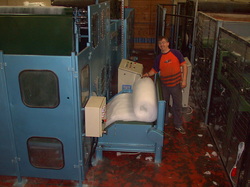
The rolled batt is produced by the manual roll up unit from either a Camel Back as shown or a Cross Lapper. The batt can be cut to length by a 4 roller breaker unit or manually. The batt is then weighed and can be stuffed into the cushion case either manually or by a Textrofil Cushion Stuffer. The degree of automation depends on the customers requirement. Cut length control can be either digital timer control or PLC control with touch screen control timings and inverter speeds.
Feather Filling Systems
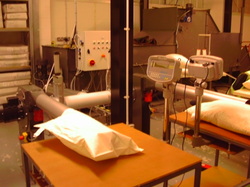
Feather cushion Filling systems with dust extraction and automatic feather loading of the stirrer tank. The system shown is capable of processing 360 kilo's per hour from two filling fans. The line has speed control of both filling fans. The loading system can be fitted with systemsto load either full bales or sacks of feathers.
Load cell weight of case segments is under development and case to nozzle clamps are available if required by the customer.
Load cell weight of case segments is under development and case to nozzle clamps are available if required by the customer.
Automatic & Manual Pillow Manufacture
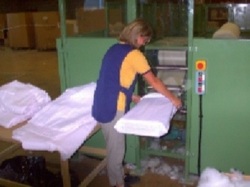
Automatic Pillow production from bale to filled Pillow at production rates of up to 8 pillows per minute on a single stuffer. Further stuffers can be added to suit higher card production.
The system can take a cross lapped web from either a Camel Back or a Cross Lapper bottom sheet and cut it both to the width and length required roll it and automatically deliver the rolled batt to the cross sheet and into the stuffer where the operative is waiting with a pillow tick to produce the pillow.
The system can take a cross lapped web from either a Camel Back or a Cross Lapper bottom sheet and cut it both to the width and length required roll it and automatically deliver the rolled batt to the cross sheet and into the stuffer where the operative is waiting with a pillow tick to produce the pillow.